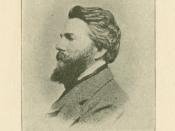While Melville only mentions the "Dead Letter Office" in the last paragraph, he portrays its significance throughout the story. Melville reveals Bartleby previously worked in a Dead Letter Office, where he handled the monotonous task of burning undeliverable mail. Because the narrator views Bartleby as a mirthless man, he feels pity for Bartleby working at a place devoid of happiness. By employing a theme of lost hope, Melville describes the dead letters as mail, which fails to reach its destination with its encouraging message or item of value. Melville associates the melancholy present in "Dead Letter Office" with the strife evident in Bartleby's life.
In Melville's short story, the "Dead Letter Office" serves as an influence upon Bartleby's fastidious nature. Throughout the story, Bartleby expresses his preferences in regard to his work, which primarily result from the dissatisfaction he felt in his previous profession.
Perhaps Bartleby's refusal in performing his duties signifies his dismissal of authority, which indicates Bartleby's desire to control his own life. By characterizing Bartleby as an isolated man, Melville demonstrates how Bartleby's environment separates him from nature and the company of others. Working in the narrator's office, Bartleby occupies a secluded area near a window, where he constantly stares at a wall. Bartleby exhibits the behavior of a loner as he stays at the office even at night, when no one occupies the streets.
When Melville states "On errands of life, these letters speed to death," he refers to the "Dead Letter Office" as a symbol of mortality (Melville 52). In describing Bartleby's former occupation, the narrator even acquaints the "dead letters" of the mail center with "dead men" (51). Melville portrays the final depressing image of death through Bartleby's former workplace, the Dead Letter Office.


